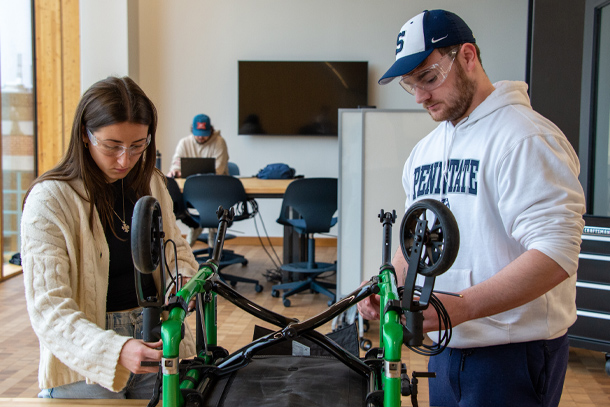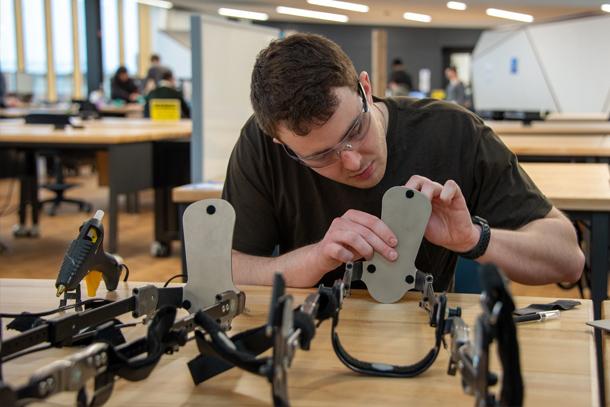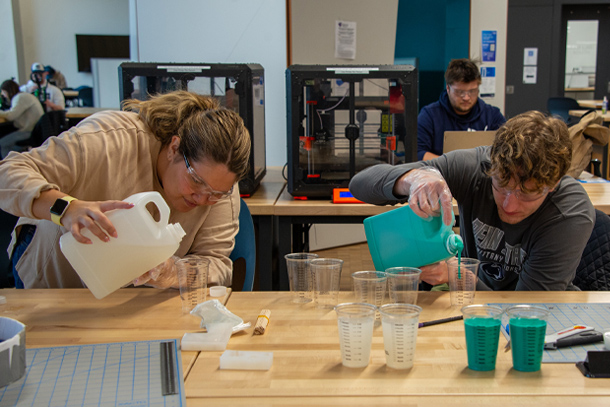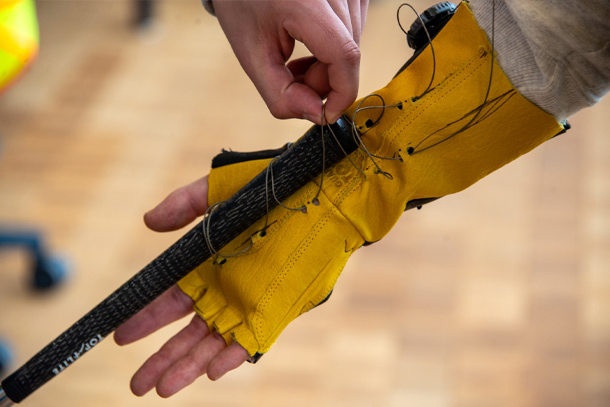
Two students in the capstone course focused on adaptive technology make adjustments to the brakes on a wheelchair to allow for a gradual slowdown. Credit: Kate Myers/Penn State
From rock climbing to dining, students use engineering to improve accessibility
June 7, 2024
By Sarah Small
UNIVERSITY PARK, Pa. — Cory Tupper, a mechanical engineering major who graduated in the spring of 2024, was aware of the positive impact engineers could make when he began his journey at Penn State four years ago, but he had firsthand experience with it his senior year.
“I can’t tell you how many times I’ve been told by professors that the work engineers do changes people’s lives and changes the world,” said Tupper, who helped design an exoskeleton leg that allows for more upper body freedom in a senior capstone design project. “Seeing the impact that this project could have, even in one person’s life, let alone however many others, it’s been eye-opening. I’ve been able to see that the work that we do does affect people’s lives.”
Tupper’s capstone project was one of five team projects in a capstone course focused specifically on adaptive technology, which is a device or piece of technology designed to provide physical or cognitive assistance. Capstones provide senior engineering majors at Penn State with hands-on experience through industry-sponsored and client-based design projects, according to the Learning Factory, which hosts the capstone design showcase each year.

Cory Tupper works on an exoskeleton leg that allows the user more upper body freedom. Credit: Kate Myers/Penn State
The capstone section focused on adaptive technology worked closely with Victoria’s Victory Foundation, which is “dedicated to providing assistance with the day to day needs of those living with spinal cord injuries, traumatic brain injuries and other mobility related disabilities,” and with Waypoint Adventures, which offers mostly outdoor adventure programs that are “adapted to accommodate people with a wide range of disabilities.”
“There's a growing gap in the needs of assistive technology and the workforce capable of actually developing and designing assistive technologies,” said Jessica Menold, associate professor of mechanical engineering and of industrial and manufacturing engineering, who led the capstone section focused on adaptive technology. “The goal of these capstone projects is to expose engineering students to this career area and get them interested and excited about assistive technologies and maybe pursuing that as a future career.”
Designs with dignity
The projects were beneficial both to the students working on them and to the organizations, according to Susan Stover, chief executive officer and executive director of Victoria’s Victory Foundation.
“The students brought their talents and knowledge from an engineering perspective to address overcoming some basic design issues with adaptive needs,” Stover said. “They were exceptional to work with and so respectful of time, deadlines and expectations. The foundation brought VVF ambassadors to each virtual meeting and sent one in person, giving the students the opportunity to work directly with end users of the products. This was vital in them truly understanding the obstacles throughout the process and designing a better product. We hope that through this experience, the students’ eyes were opened to the numerous opportunities that exist and the need for engineers to be exploring careers in adaptive products.”
According to the students, the projects helped them to consider not only how the device could be designed to function well but also how the device could be designed to allow for dignified use by the client. It addition to the exoskeleton leg, other projects included a glove and harness to assist those with quadriplegia with golfing; wheelchair brakes that allow for a gradual slowdown and can be employed by a person with limited hand use; a seat that helps individuals get in and out of a canoe independently; a seat to help with belaying down a rock-climbing wall; and a plate that aids in cutting food and feeding without assistance.
“The idea is to create something that is adaptive and adaptable depending on the specific use case and something that looks dignified that won’t pull additional glances,” said Robert Chiccarine, a mechanical engineering major who also graduated in the spring of 2024.
Chiccarine helped design the adaptive plate that could be used by a person who has only one hand or limited function with their hands. The plate included a sticky, nonslip surface on the bottom of the plate that prevents it from sliding on the table and removable, interchangeable inserts that suit different foods — for example, one that has walls to press peas, rice or other loose foods against in order to scoop them and another with prongs sticking upward for the stabilization of meat so that it can be cut with just one hand.
“A lot of adaptive meal ware will have big suction cups or giant plastic parts or bright colors, because a lot of the customers are children,” Chiccarine said. “We wanted to design something that will allow people to eat independently and with dignity.”

The capstone class met throughout the spring semester in the newly constructed Engineering Design and Innovation Building, where students have access to a full floor makerspace complete with 3D printing, laser cutting, sewing machines, mold making tools, and many other maker technologies. Credit: Kate Myers/Penn State
Prioritizing accessibility, now and in the future
Some of the students will carry this experience with adaptive technology directly into their next professional move. For example, biomedical engineering major Claire Nichols just graduated and will now attend the University of Pittsburgh in the fall for prosthetics and orthotics so that she can contribute to adaptive technology through artificial limbs.
Others will not enter a field directly related to adaptive technology but will still take with them the principles learned in the project.
“This capstone course allowed us to implement and learn more about adaptive tech, which is really helpful going into the industry,” said Gianna Gagliardi, who earned a bachelor’s degree in mechanical engineering this May. “For example, I’m starting a job in July with a company called Xylem as part of their Engineering Leadership Development Program, and they have everything to do with water. There are ways I’m thinking of even now to make water pumps more streamlined and accessible so more people can use them, whether it’s in industry or more personalized. It’s something that shouldn’t be super complicated. Water is something we all need, so technology surrounding water should be accessible to everyone.”
Menold said that in addition to this capstone section, she plans to host adaptive technology-related Build Nights in the EDI building to provide more firsthand learning opportunities for engineering students at all stages of their academic career. She said the first project will be to build a smart walking stick that can detect objects around it.
“I hope that the exposure to adaptive technology and its impact on society will translate into increased interest in the field as a meaningful career pathway for our engineering students,” she said.
Based on the outlook of students such as Gagliardi, Nickols, Tupper and others, it’s a hope that already seems to be coming to fruition.

Students in the class designed a glove and harness to assist those with quadriplegia with golfing. Credit: Kate Myers/Penn State



